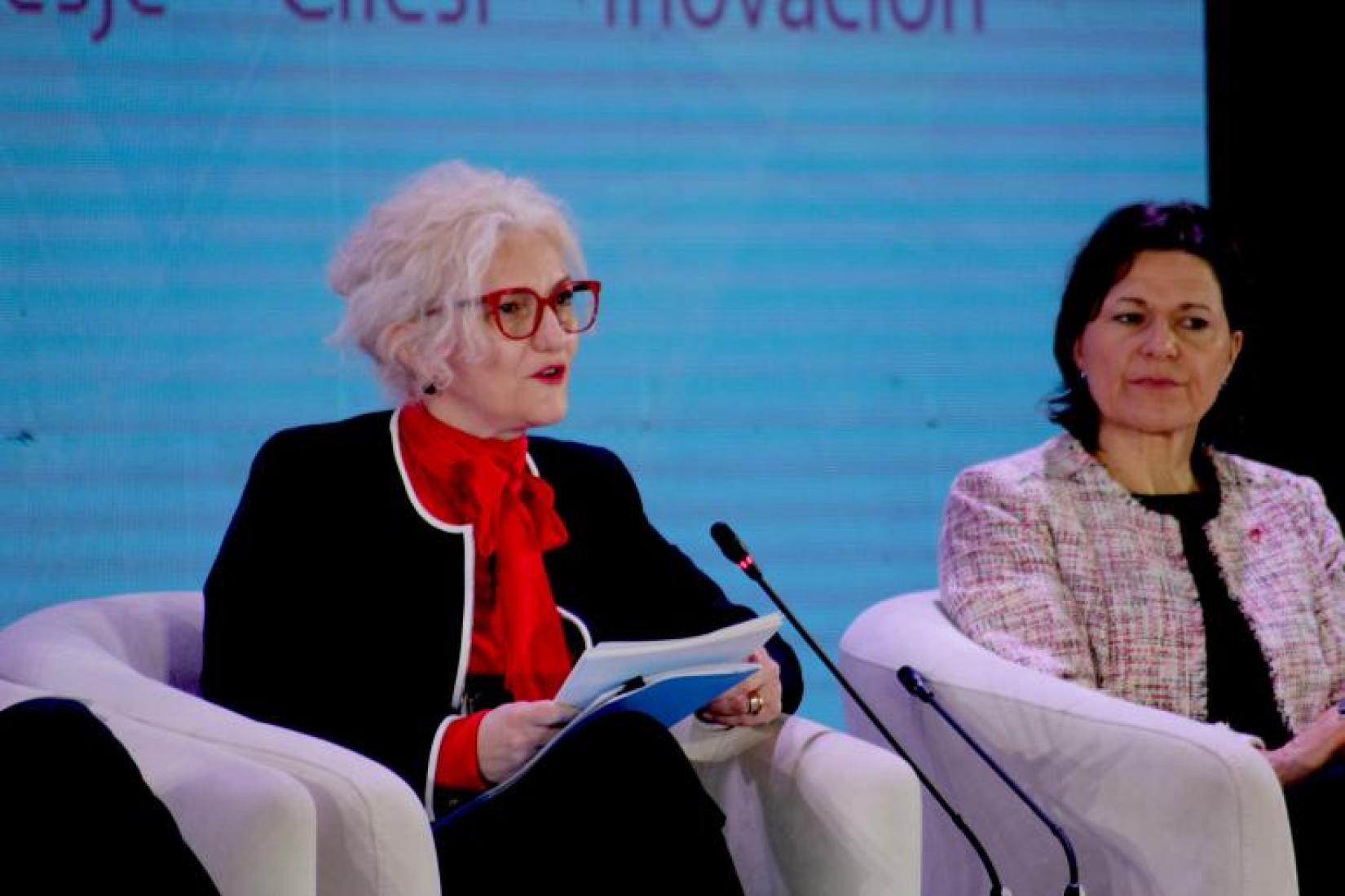UNICEF - Public Statement by Eva Kadilli, Director of Supply Division
23 mars 2023

Eva Kadilli, Director of Supply Division UNICEF, public statement at Albania’s 1st Health Congress
Albania’s 1st Health Congress brought together policymakers, health experts, healthcare professionals, service users, and other key stakeholders to share experiences and engage in dialogue regarding the challenges of health systems. The congress helped to provide a medium for stakeholders to reflect, learn and adapt best international practices with the purpose of providing better care, increasing the quality of services, and being up to date with the latest innovation. Among the special guests invited was Eva Kadilli, Director of UNICEF, Supply Division.
Read the statement below:
"Let me also express my gratitude to Prime Minister Rama and Minister Manastirliu for their leadership and for convening this important and forward-looking forum. I am pleased to see such a comprehensive agenda, which is illustrating the strides that Albania is making to provide affordable, quality, and timely health services to all. UNICEF applauds this commitment and joins WHO and other partners in supporting the Government of Albania in these efforts. At the heart of this agenda is primary healthcare.
Decades of evidence demonstrate that primary healthcare is the best platform for responding to evolving health needs, demographics, environmental challenges, outbreaks and emergencies. Among the areas where a strong system is perhaps the most essential is public health emergencies—as the COVID-19 experience demonstrated. At the global level, we saw how investments made before and during the pandemic – such as cold chain infrastructure – supported the rollout of COVID-19 vaccines. As we move beyond the pandemic response, investments in strengthening resilient systems must continue.
UNICEF is a strong advocate for primary healthcare, and in the European region, we are supporting efforts ranging from defining packages of services—to costing and financing—to digital tools to strengthen health information systems. During the COVID-19 pandemic, we supported Albania’s response through the procurement of COVID-19 vaccines and related supplies, as well as training for infection prevention and control measures. In addition, our joint work on community engagement and social listening has helped us understand the barriers to immunization uptake. UNICEF has been supporting the government of Albania to procure other quality-assured supplies at affordable prices, such as PCV vaccines to prevent pneumococcal disease, as well as anti-retroviral drugs and tuberculosis medicines, among other life-saving commodities.
At the core of the primary healthcare agenda, is equitable access—including reaching the most vulnerable and marginalized. Children with disabilities are just one example. Assistive Technology, such as pediatric hearing aids, can transform a child’s life. And UNICEF is supporting governments to expand access to Assistive Technology products via primary healthcare platforms. Adolescent mental health is another critical area of focus, as the pandemic took a very heavy toll on this age group. Together with WHO through our Joint Programme on Mental Health, UNICEF is working with the Albania Ministry of Health to reach adolescents with services to support their mental health and psychosocial well-being.
I would also like to take this opportunity to congratulate the government for introducing the human papillomavirus (HPV) vaccine last year, and committing to protecting adolescent girls against cervical cancer over the course of their lifetimes – which is a leading cause of mortality among women in Albania, according to WHO. Beyond the prevention of non-communicable diseases, access to treatment is also critical. UNICEF is working with WHO and experts at the St Jude Research Hospital to expand access to childhood cancer medicines. The program is being piloted in 6 countries in different regions, and we hope to expand to other countries in the near future. For all treatments and all medicines, ensuring patient safety is of absolute importance. Addressing substandard or falsified products is essential in the fight against drug-resistant infections. Barcoding technology can help verify the authenticity of health products, and looking forward, barcoding will be a requirement for all medical products procured by UNICEF.
Strengthening healthcare systems and ensuring their resiliency – while also reaching the most vulnerable — are two sides of the same coin. This can only be achieved by working together across government and partners. We must leverage our respective strengths and seek innovative and sustainable solutions. This must also include the private sector, and we call upon these leaders for local solutions to help advance this agenda.
In conclusion, I extend my gratitude, on behalf of UNICEF, for the opportunity to take part in this event. UNICEF is committed to supporting the Ministry of Health, together with all of you – and all partners, to build a more resilient and healthy future for children."
*Click here for the original source.

















